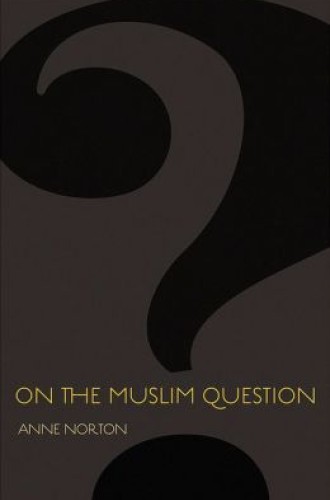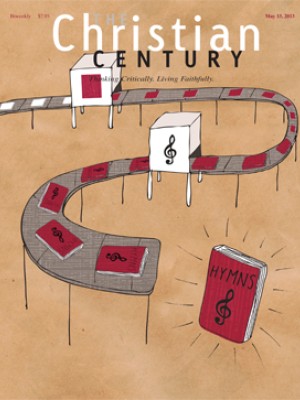On the Muslim Question, by Anne Norton
The “Jewish question” was long a topic of concern in post-Enlightenment political thought. Jews were the unassimilated other that called into question the impartiality, universal rationality and secularism of modern political theory and practice. Anne Norton argues that the “Muslim question” has arisen as a locus of similar anxieties about national insecurity, threat from a foreign other, and the danger to democracy of fanatical religious irrationality. Like modernity’s Jew, today’s Muslim is more a projection than a reality, and the resulting distortions are unfair to actual Muslims both in our midst and beyond our borders. It is a sense of misrepresentation and injustice, along with a haunting awareness that European handling of the analogous Jewish question turned out so badly, that motivates Norton’s investigation of how the Muslim question is manifested.
On the Muslim Question is not so much an investigation of Muslims as it is an investigation of the West—European and North American—and its anxieties about Muslims. News media story lines and public intellectuals’ warnings about Islam in many cases collapse in the light of Norton’s analysis.
Read our latest issue or browse back issues.
Sometimes Norton, a professor of political science at the University of Pennsylvania, states the obvious: that Western critiques of Muslim attitudes toward human rights reveal a double standard, or that criticisms of Swiss modernist Muslim intellectual Tariq Ramadan are patently unfair because they are based not on the content of his writings but on his being the grandson of the founder of the Muslim Brotherhood. At other times, she carefully presents evidence that counters received accounts of famous events—as when she shows that the Danish cartoons of Muhammad did not result in mass violence against Westerners in 2006 and that those events were largely the result of intentional and repeated provocation by Danish instigators.
A third strategy Norton uses is to present a broad historical and philosophical context for understanding Islamic political thought and the particular misconceptions she seeks to correct. For example, her discussion of Sayyid Qutb, the Muslim Brotherhood extremist known for his inspiration of terrorists (“true,” she says, “but not the whole truth”), takes us beyond selective and polemical readings of his work to show his concern for human dignity and social justice: “Even this intolerant, fanatic man has something to teach us about human rights, human dignity, and equality.”
Norton’s arguments are especially strong in her nuanced reading of sexuality as a domain of intracultural struggle in the West that gets played out in the presentation of Islam as a backward, misogynistic religion. Otherwise progressive feminist voices call for the liberation of women in Muslim countries, but in the process, actual women who defend the veil or polygamy are silenced.
Likewise, Norton’s analysis of freedom of speech demonstrates the double bind in which Muslims in the West find themselves: they are constrained to condemn terrorism and thus forced to speak; yet it is not possible for them to speak enough, nor can their speech be sufficiently loud to be heard.
Two strengths make Norton’s work stand out in the crowded field of books that address Islam and democracy. First is her insistence on considering Islamic voices of the past and present, from medieval philosopher al-Farabi to Qutb and Ramadan, as conversation partners within the Western tradition. Second is her concise rebuttal of prominent philosophers, in particular Jacques Derrida, John Rawls and Slovaj Žižek, each of whom has perceived a danger in the nature of Islam.
Derrida said that he based his discussion of Islam as “the other of democracy” on “the little that I know.” Norton points out the fallacies and danger of Derrida’s characterization. Islam is not outside of Latinity, she asserts, and she addresses the morphing concept of Europe and its changing inclusion and exclusion of Islam. Citing common Arabic greetings and the 14th-century historian Ibn Khaldun, Norton expresses her preference for an Islamic notion of hospitality—of making the other at home—to that of Derrida, whose understanding of hospitality always has an element of hostility within it. John Rawls, defending his conception of tolerance, posited an imaginary “Kazanistan” as an other of democracy that can be tolerated, within bounds. Norton critiques the stereotypes that Rawls took for granted in the creation of his imaginary Islamic republic. Žižek defends Jewish-Christian society as the only stable soil for the growth of a vibrant rational atheism.
For each philosopher, an assertive Islam challenges a vulnerable secularity. But the inherent danger to secularity comes not just from Islam, but from any religion that has not been domesticated by the secular. “Islam” becomes the stand-in for all religion that does not accept the consensus of the liberal, secular social contract, which relegates the religious to the private, individual realm. The little that each of these philosophers knows leads them to erudite but wrong-headed conclusions.
The Arab Spring and its results show Norton that there is nothing innately antidemocratic about Islam. Illegitimate political regimes with roots in colonialism have been rightly challenged and in some cases replaced. The nascent democracies’ future is still open. But Norton reminds readers of the humanity of the people involved, and she presents her arguments with a primary commitment to examining the West’s own failures, ambiguities and self-serving reports of its own virtues.
Despite the “us and them” approach of many commentators on the relation of Islam to the West, Norton concludes that there is no “clash of civilizations”: Muslims are already in our midst and are well integrated into North American and European societies. She gives examples of grocery goods and of Muslim politicians, hip-hop artists and graphic novelists (she leaves out some personal favorites: the Canadian situation comedy Little Mosque on the Prairie and pop musician Dawud Wharnsby’s Animals Love Qur’an). Her hopeful ending to an engaging book invites readers to know our neighbors better and to make our communities more open to Muslims in our midst.







